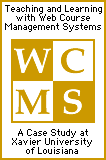Teaching and Learning with Web Course Management Systems

Narratives and Data: Introduction
In March 2000, Xavier University's Center for the Advancement of Teaching invited proposals from all faculty members to participate in a case study aimed at the following questions: With respect to Web-based course management systems (WCMS):
- As regards teaching and learning, what are their advantages and disadvantages?
- How do the course management systems change, if in fact they do, the teaching and learning process?
The case study will also permit the University to examine Web course management systems in order to determine the type of support that should be provided for faculty and students in order that they may use these tools.
The Center recognized that experience with educational technologies varies among faculty members. Therefore, consideration was given to both novice and experienced faculty members. The Center also recognized that adding substantive on-line components to a course alters the need for traditional class meetings. Therefore, with the support of the Vice President for Academic Affairs and the Dean of the College of Arts and Sciences, 25-33% of traditional class time could be replaced with on-line collaboration and other Web-based course activities.
The Center offered varies kinds of support to faculty members interested in the case study. For example, it hosted a "Course Management System Information Day" to provide interested faculty an opportunity to examine the systems and discuss the request for proposals. The Center also:
- Arranged for the trial use of the systems with the application providers and where necessary, a server was provided by the university.
- Provided stipends to the faculty members
- Assisted faculty in learning to use the tools and developing the on-line components of the course
- Provided training for students enrolled in the courses
- Designed and hosted a summer seminar for funded faculty members (see below)
- Will draft a report that will address the case study questions and provide an analysis that may serve to inform policy decisions regarding the university's decisions on course management systems
Faculty members whose proposals were funded were expected to:
- Substantially change a course by using a Web-based management system
- Work with Center staff to develop survey(s) aimed at assessing the various aspects of the course delivered by the Web course management system
- Submit progress and final reports
- Present the results of the project at a roundtable discussion or workshop for faculty
In summer 2000, six faculty members from the Division of Education, and the Communications, History, and Biology departments developed on-line components of their courses using Web course management systems such as WebCT, eCollege, Anlon, and Blackboard. The Center hosted a summer-long on-line seminar for the faculty members to assist them in course development. The faculty members participated in face-to-face meetings and on-line activities using the on-line seminar resources, which were delivered using an eCollege seminar website. The seminar included six modules:
- Module 1: Orientation
- Module 2: Course Structure
- Module 3: Assessment
- Module 4: Asynchronous & Synchronous Communication
- Module 5: Tools & Resources
- Module 6: Fair Use & Intellectual Property Rights
<-- Narratives & Data Table of Contents | Next Section -->
WCMS: Home | Executive Summary | Final Report | Narratives and Data | Findings | RealVideo Tour | Webliography
![[Xavier Seal]](/images/xavier-seal.png)
![[CAT+FD Logo]](/images/cat-site-icon.png)